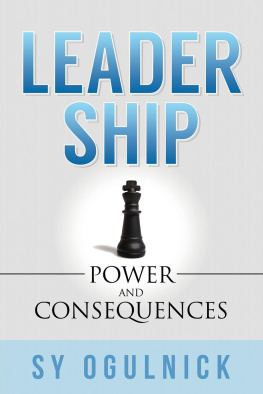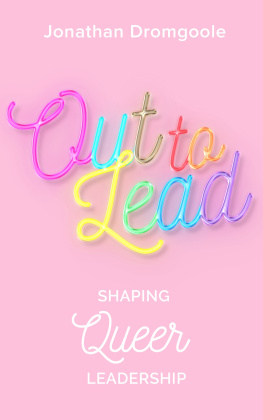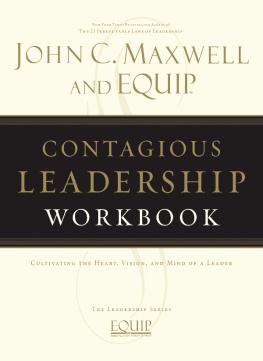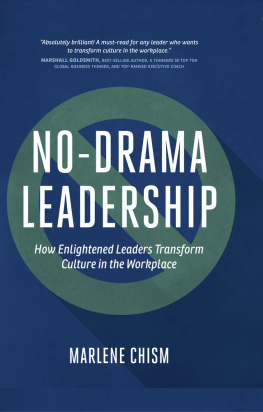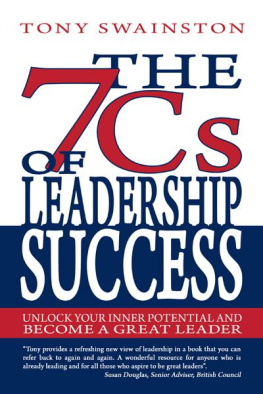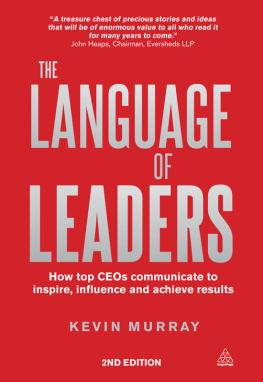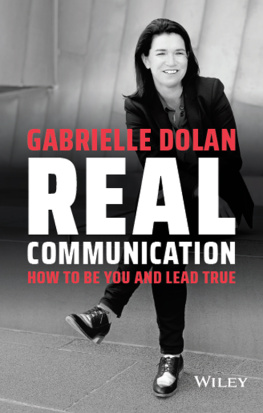LEADERSHIP
LEADERSHIP
POWER
AND
CONSEQUENCES
SY OGULNICK

NEW YORK
LEADERSHIP
POWER AND CONSEQUENCES
2015 SY OGULNICK.
All rights reserved. No portion of this book may be reproduced, stored in a retrieval system, or transmitted in any form or by any meanselectronic, mechanical, photocopy, recording, scanning, or other,except for brief quotations in critical reviews or articles, without the prior written permission of the publisher.
Published in New York, New York, by Morgan James Publishing. Morgan James and The Entrepreneurial Publisher are trademarks of Morgan James, LLC. www.MorganJamesPublishing.com
The Morgan James Speakers Group can bring authors to your live event. For more information or to book an event visit The Morgan James Speakers Group at www.TheMorganJamesSpeakersGroup.com.
ISBN 978-1-63047-310-5 paperback
ISBN 978-1-63047-311-2 eBook
ISBN 978-1-63047-312-9 hardcover
Library of Congress Control Number: 2014942291
Cover Design by:
Chris Treccani
www.3dogdesign.net
Interior Design by:
Bonnie Bushman

In an effort to support local communities, raise awareness and funds, Morgan James Publishing donates a percentage of all book sales for the life of each book to Habitat for Humanity Peninsula and Greater Williamsburg.

| Get involved today, visit
www.MorganJamesBuilds.com | 
|
DEDICATION
To my wife, Lenette, without whom I do not exist, and if I do, only as half or less a person.
FOREWORD
The following three brief stories are particularly important in that they shed light on a philosophy of leadership from its beginning in the late 1940s to today and continuing its progression. Each of these stories was written by a professional with whom I worked to turn an atmosphere of leadership problems into an environment of genuine dialogue, a feeling of community and a deep awareness of personal responsibility to ones self and the people with whom they live and work. The first is written based on experiences from 1950s and 1960s. The second is based on events that took place in the 1980s and 1990s. The third and final story occurred between 2000 and 2014.
EXPERIENCES FROM THE 1950s AND 1960s
I had the great fortune to have intertwined my early teen years with Sy Ogulnicks exploration into the nature of leadership. First as a twelve-year-old camper and later as a junior counselor, naturalist, counselor and finally as a director, I had the unique experience of not only experiencing the system, but seeing how it worked and finally imprinting a small amount of myself on the system.
What I came away with was a clear picture of essentially two interlocked systems. First was the public face of summer camp. This was the image Sy presented in living rooms all over the Los Angeles area, and the experience the campers had during their stay at camp. The camper experience was a sense of unbounded freedom. Everything was possible as long as it was done as a group (of course, there was private time as well). Even the living environment was under their control. Cabins could be decorated, modified, expanded and re-imagined as a Japanese temple. There was only one rule, and it often was unnecessary to even state that the rule existed: Everyone had a say in the daily life of the group. Even the oddest, most individual of desires had to be accommodated in some manner. Groups became small, independently functioning societies. The campers felt empowered, and they were. It was truly a magical experience for them. There was freedom to realize activities, ideas and events that were simply impossible to achieve in their regular home and school world.
The other system was the staff and infrastructure of the camp. We didnt know it at the time, but we were really producing a large piece of collective theatre. We created a stageour eighty acres in the Northern California woods and provided the props (lumber, paint, balls, arrows, tools, pots, pans, etc.) and the usually invisible direction that kept the system running. It was the means of implementing direction that I believe really made the whole production possible. First, of course, the system was decentralized with the focus being on the camper; everything, even the staff, was there for the campers. The counselor was the nucleus, but not the focus of the camper group. Other functions, food service, wranglers, art specialists, water ski instructors were there for the campers as well. Thus, every single decision was made with the camper experience in mind. Even something as mundane as a decision to install path lighting was discussed in terms of the need for safety vs. the need to experience the world in as natural a state as possible.
The counselor, the leader of the small group, is where it all came together. It was the counselors job to create the magic the campers were to experience. There was not one way to make this happen. Instead, there were infinite ways to achieve this goal. At times, for example when there was real physical danger, the counselor became the authority and took on an almost dictatorial role. But most other times the counselor was just another member of the group, but ever aware of his or her responsibilities to the campers. Counselors promoted growth and adventure ideas and created space for the least popular of ideas that came from individual campers.
It was leadership, but yet it did not conform to any of the classic ideas of leadership. It was fluid, dynamic and responsive to the physical and personal situation either in anticipation or during an event. Thus, as the campers passed through the theater we called camp, they were totally unaware of what made this all work; they never saw behind the scenes.
For those who decided to continue on and become junior counselors and move into staff positions, the system slowly opened itself to their view. It was not a hidden system; in fact, considerable time was spent in discussion on how it worked. We shared our ongoing experiences, sought deeper understanding and innovation and creativity in a way that would allow others to recreate the magic in their own groups. In other words, camp was not ruled by a hierarchy but through face-to-face dialogue and ultimately what was best for the camper.
Of course, like Puff, A dragon lives forever but not so little boys and girls. Campers move on, grow up and enter the adult world. That is the beauty of what I have described above that Sy has nurtured and brought to organizations throughout our country and is found in this powerful and thought-provoking book. It is this ability to create magic that is not limited to children. Magic can be created on a factory floor, in a sales room, an office, a farm field, a classroom full of students and our own homes; but it all depends on leadership and the appropriate and magical use of power.
Understanding and experiencing what trust, safety and respect do for people who come to exercise their own potentials is not only rewarding for the leader and those they are responsible to but also for their relationships, whether personal or business-related. I learned early on how doable this all is, and also how rare it has been to rediscover once again in our living and work relationships.
Next page
